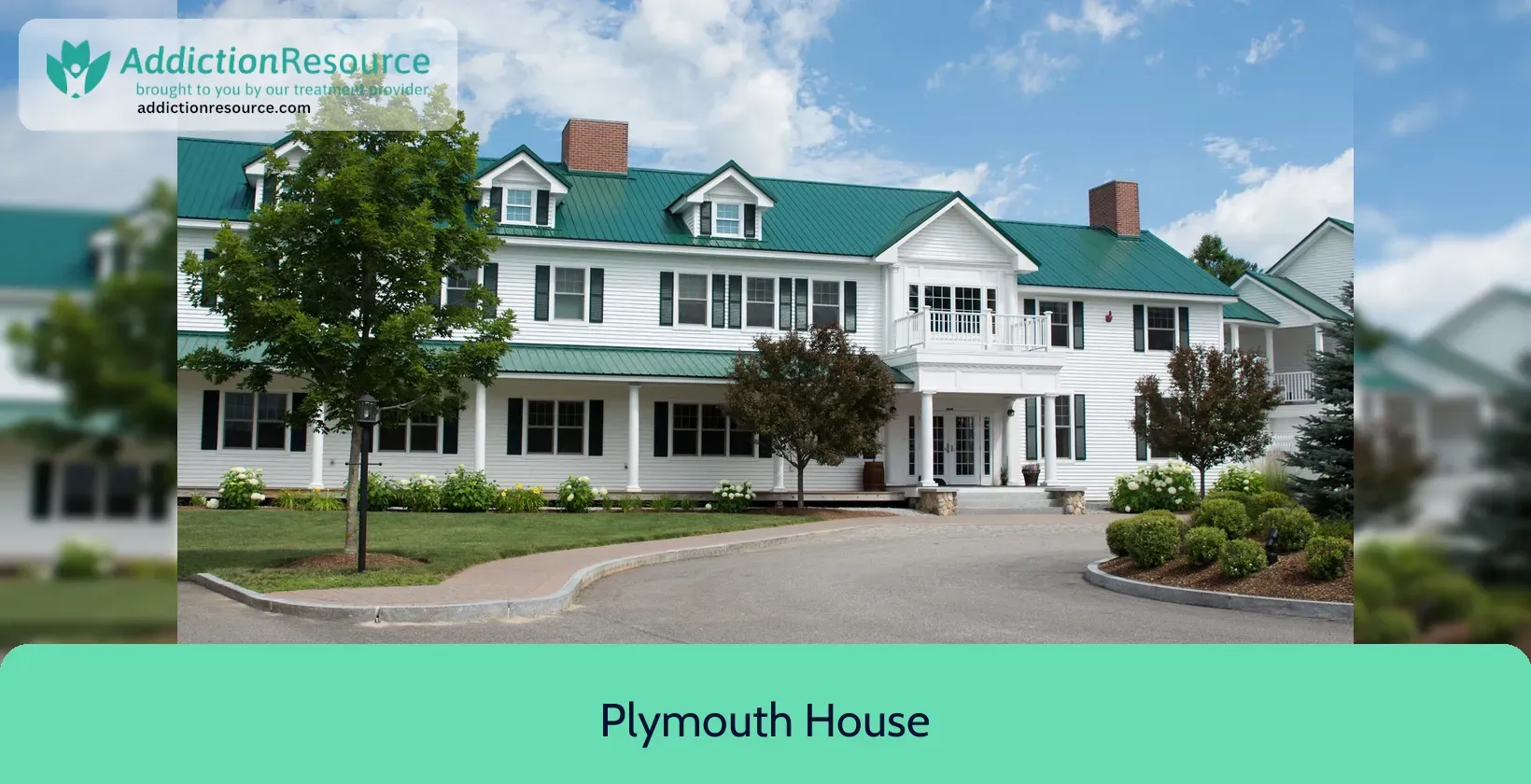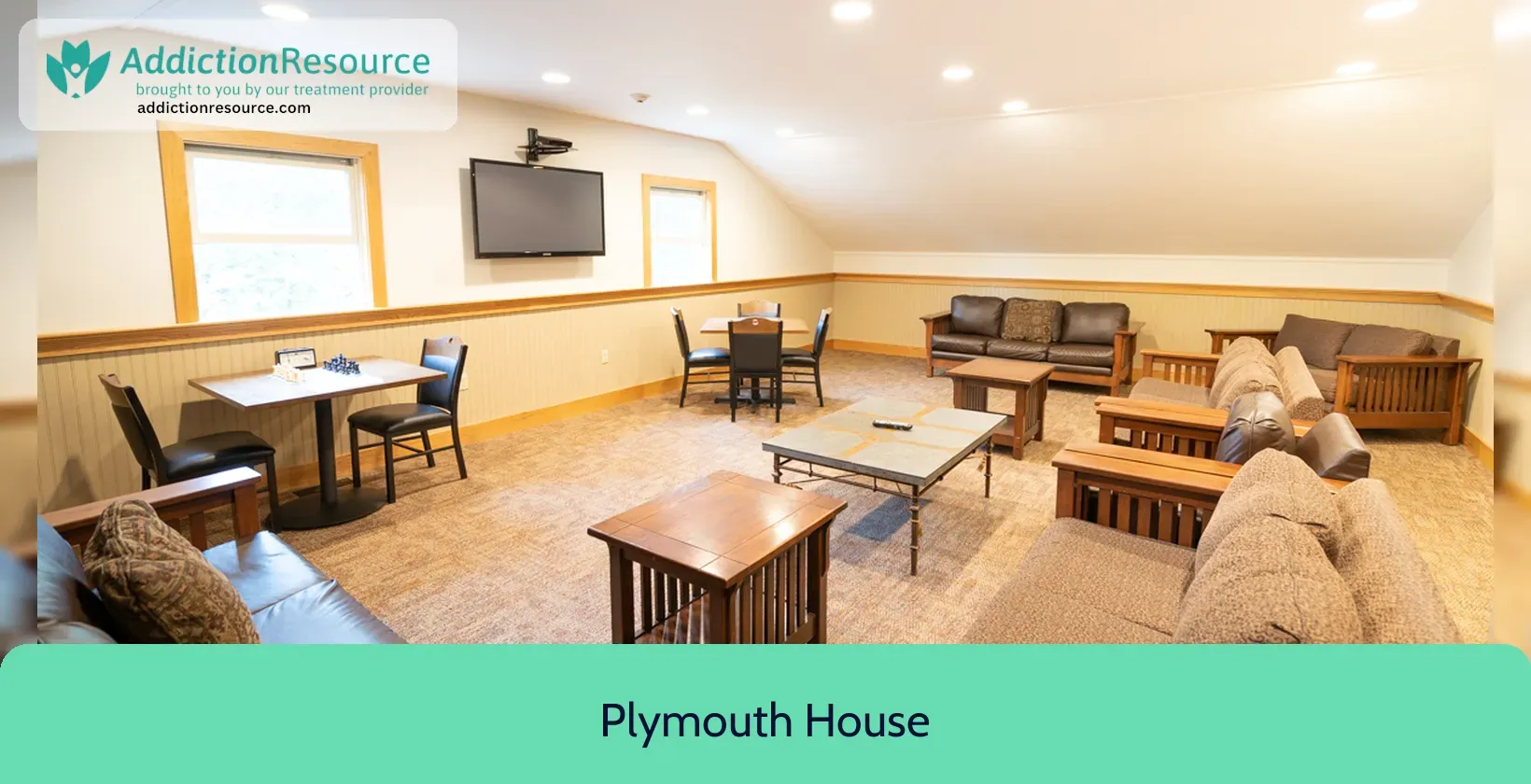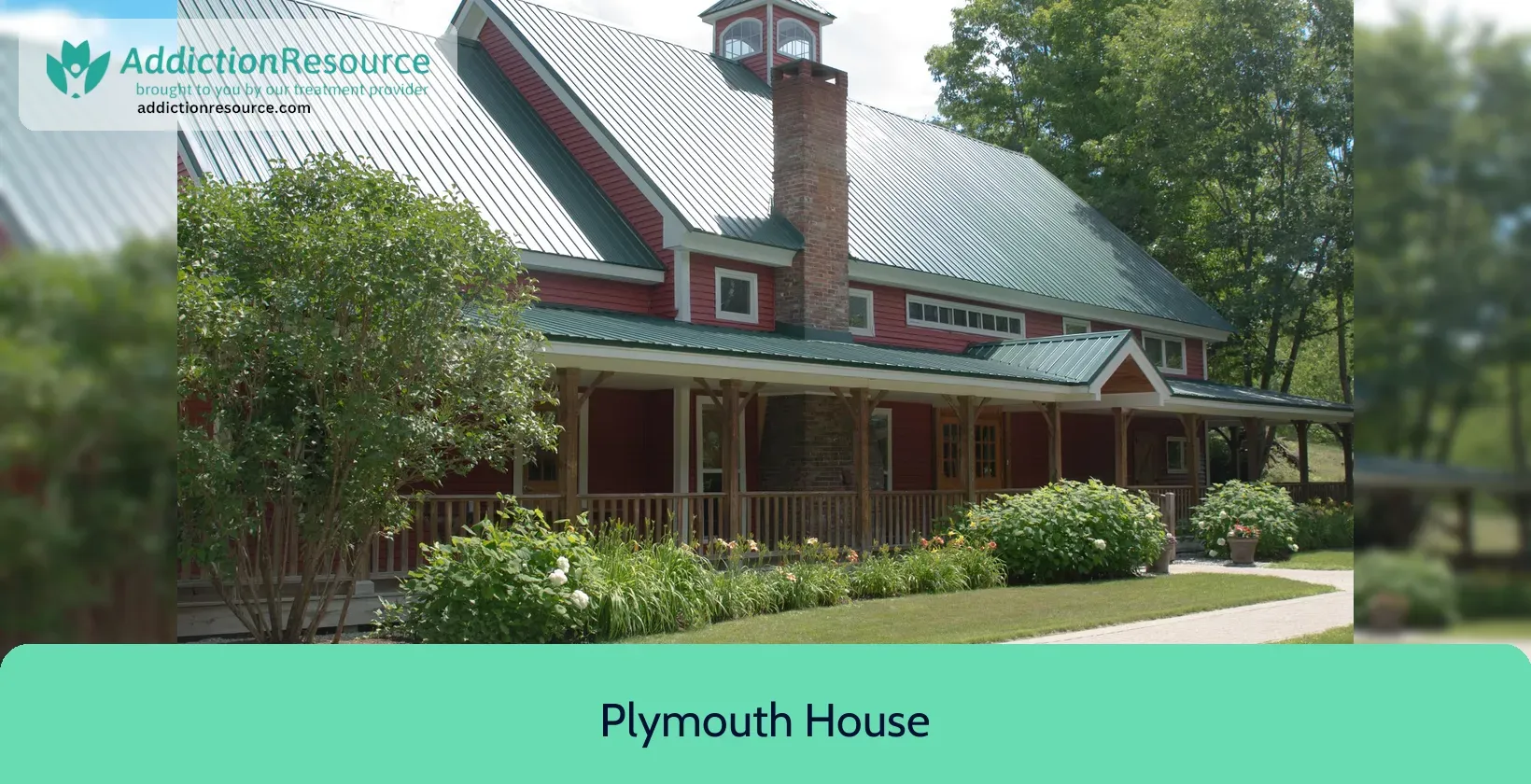Plymouth House – Plymouth, New Hampshire in Plymouth Overview
Plymouth House, a rehabilitation resort based on Alcoholics Anonymous’ 12-step program, provides drug and alcohol addiction treatment in Plymouth, New Hampshire. Adult clients may work toward recovery in a calm setting at this private institution, which is situated on 60 acres close to the breathtaking White Mountains. In addition to addiction therapy, Plymouth House emphasizes holistic methods that take into account the mind, body, and soul.
Clients remain on campus in a community-focused living environment while undergoing inpatient treatment, where they form support systems with other residents. Clients adhere to a regimented daily routine under the careful supervision of staff members, which combines leisure and recovery activities including 12-step meetings, goal-setting, introspection, meditation, yoga, hiking, and work based on the 12-step Big Book. Clients are urged to fully participate in the 12-step program and lay the groundwork for long-term recovery in an intense setting. Although the length of stay may be changed depending on specific requirements, stays often last between two and four weeks.
Clients go into the Partial Hospitalization Program (PHP) after finishing inpatient care, where they become ready for life after treatment. With a fresh emphasis on incorporating recovery into their everyday lives, PHP clients continue to participate in the same organizations and activities they did while receiving inpatient therapy. PHP is available six days a week and is intended to assist clients in establishing their recovery plans prior to their reintegration into their communities.
An essential component of Plymouth House’s curriculum is aftercare planning. Clients collaborate with a personal care team to create customized strategies to aid in their continued recovery as PHP draws to a close. The Extended Care program provides the opportunity to move into a sober living home while still taking part in the recovery-focused activities offered by the facility for those who would need further assistance before regaining their complete freedom. Before returning to life outside of treatment, graduates of our prolonged program are guaranteed to have a solid foundation.
Since its founding in 2002, Plymouth House has served as a ray of hope for people and families trying to overcome addiction. Plymouth House functions as a 12-step retreat rather than a traditional treatment facility, giving people the chance to detach from everyday life and fully immerse themselves in the 12-step process. This method, which was developed by its originator, Tom S., highlights the 12 steps’ transformational potential as a means of achieving mental, emotional, and physical health.
Plymouth House became a part of Guardian Recovery Network in 2021, adding to its offerings by fusing its proficiency in the 12-step recovery process with Guardian’s superior clinical and medical care. Plymouth House added primary care doctors, certified psychiatrists, and seasoned clinicians to its team as part of this network, enabling clients to receive top-notch medical treatment in addition to their rehabilitation efforts. This collaboration has also made it possible for people to utilize health insurance to pay for therapy, increasing access to the retreat’s transformative offerings.
The Plymouth House provides a unique setting where people may devote themselves entirely to the 12 steps under the supervision and assistance of professionals. Numerous individuals who come to the facility may have tried the 12-step method in the past but unable to stick with it while juggling the demands of everyday life. Clients at Plymouth House get the time, space, and expert attention they need in order to fully participate in the processes and finish the work more deeply. Guests diligently complete the first seven steps in the primary care program with the help of a committed therapist and a 12-step contact. After completing all 12 phases, those who stay in the extended care program will return to their regular lives.
Hope Without Commitment
Find the best treatment options. Call our free and confidential helpline
Most private insurances accepted
Treatment Options
The facility offers multiple levels of care, such as:
- Mentoring/peer support
- Housing services
- Discharge Planning
- Employment counseling or training
- Self-help groups
- Naloxone and overdose education
- Outcome follow-up after discharge
- Recovery coach
The center treats the following addictions and co-occurring disorders:
- Clients who have experienced trauma
- Screening for tobacco use
- Comprehensive mental health assessment
- Comprehensive substance use assessment
- Interim services for clients
- Outreach to persons in the community
- Screening for mental disorders
- Screening for substance use
- Professional interventionist/educational consultant
- Complete medical history/physical exam
Treatment Modalities
Cognitive Behavioral Therapy (CBT) is a therapeutic approach that emphasizes the interconnectedness of thoughts, emotions, and actions. It promotes healthy reactions to thoughts and emotions, steering individuals away from harmful responses such as substance abuse. Proven effective for various addiction recoveries, CBT enhances an individual’s self-awareness and self-control. Through CBT, individuals learn to better gauge their emotional well-being, communicate more effectively, and handle stress without resorting to drugs or alcohol.
Substance use disorder counseling treatment modalities refer to various approaches and methods used in the counseling and treatment of individuals with substance use problems. This can include individual therapy, group therapy, cognitive behavioral therapy, motivational interviewing, family therapy, and 12-step programs. The goal is to help the individual overcome their substance use, develop healthy coping skills, and lead a fulfilling life in recovery.
Trauma-related counseling is a specialized form of therapeutic intervention aimed at assisting individuals who have experienced distressing, life-altering events. This approach focuses on helping clients process their traumatic experiences, develop coping mechanisms, and rebuild a sense of safety and trust. Counselors trained in trauma therapy use evidence-based techniques to support healing and resilience, ensuring survivors can move forward and lead fulfilling lives despite their past adversities.
Recovery approaches rooted in 12-step programs prioritize extensive peer mentorship and highlight personal development as a cornerstone for maintaining sobriety. Attending 12-step meetings, which are confidential, cost-free, and held daily, is a fundamental component. The 12 steps are grounded in spiritual tenets, guiding participants to confront the core issues of their addiction, assume accountability for their decisions, and recognize aspects out of their control. Chosen sponsors offer individualized guidance and support.
Intervention Services are professional services aimed at addressing and amending harmful behaviors or situations, primarily in individuals struggling with addiction or other serious issues. These services guide and support both individuals and their loved ones through the intervention process, wherein a structured, solution-oriented conversation is held to encourage the individual to accept help and make positive changes towards recovery. By blending compassionate understanding with a well-formulated approach, intervention services play a crucial role in bridging the gap between acknowledgment of an issue and taking the initial steps towards resolution.
Contingency management and motivational incentives are evidence-based treatment modalities used in addiction and behavioral health programs. Contingency management involves the use of rewards to reinforce positive behaviors and change negative behaviors, while motivational incentives provide incentives to engage in treatment and sustain recovery. Both approaches are designed to increase motivation and engagement in treatment and have been shown to be effective in promoting positive outcomes.
Motivational Interviewing (MI) is a client-centered counseling approach designed to enhance an individual’s intrinsic motivation to change by exploring and resolving ambivalence. Through empathetic engagement and evoking personal reasons for change, MI helps individuals recognize the negative consequences of their substance use and empowers them to take steps toward recovery.
The goal of anger management is to reduce both your emotional feelings and the physiological arousal that anger causes. It is generally impossible to avoid all people and settings that incite anger. But a person may learn to control reactions and respond in a socially appropriate manner. The support of a mental health professional may be helpful in this process.
The Matrix Model is a well-organized, multifaceted behavioral treatment approach that incorporates evidence-supported techniques such as relapse prevention, family therapy, group therapy, psycho-education, and self-help. These components are systematically and clinically coordinated to provide a comprehensive treatment experience.
The Relapse Prevention Model is a cognitive-behavioral approach designed to teach individuals who are trying to maintain behavioral changes (like sobriety from drugs or alcohol) how to anticipate and cope with the potential for relapse. The model emphasizes the importance of understanding the processes and triggers that lead to relapse, developing strategies to prevent initial lapse, and minimizing the severity and duration if a lapse occurs. It’s grounded in the belief that relapses can be viewed as learning opportunities, helping individuals strengthen their commitment and skills to avoid future setbacks.
Holistic Treatment refers to an integrated approach to recovery that addresses the physical aspects of addiction and the individual’s emotional, mental, and spiritual needs. This method incorporates a variety of therapies, practices, and activities, such as nutrition, mindfulness, yoga, and counseling, to promote overall well-being, self-awareness, and balance. By treating the whole person, holistic treatment aims to ensure a more comprehensive and sustainable recovery.
Individual Psychotherapy provides a private, one-on-one setting where clients can explore and address their personal challenges, behaviors, and feelings related to addiction and recovery. With the guidance of a trained therapist, clients work to uncover the root causes of their substance use, develop coping strategies, and build a foundation for long-term recovery and personal growth.
Dialectical Behavior Therapy (DBT) is a cognitive-behavioral approach specifically designed to help individuals regulate emotions, enhance interpersonal effectiveness, develop distress tolerance, and increase mindfulness. In addiction treatment, DBT equips individuals with practical skills to manage triggers, cope with stressors, and build a life worth living without resorting to substance use. By addressing both the emotional and behavioral challenges of addiction, DBT fosters personal growth and long-term recovery.
Group Counseling is a therapeutic approach where individuals come together under the guidance of a trained counselor to share experiences, provide mutual support, and gain insights. It fosters a sense of community, promotes understanding through diverse perspectives, and offers personal growth and problem-solving strategies.
EMDR is a therapy method initially designed to address trauma. During an EMDR session, patients engage in eye movements reminiscent of REM sleep, either by following a therapist’s moving finger or tracking a light bar. These repetitive eye movements aim to aid the brain in reprocessing memories, potentially diminishing the severity of traumatic recollections. As a result, related memories may also heal, leading patients to feel notably more at ease, balanced, and emotionally composed.
Family Counseling is a therapeutic approach that seeks to address and resolve conflicts, improve communication, and strengthen relationships within the family unit. By providing a safe space for family members to express their feelings and concerns, a trained counselor facilitates understanding and collaboration among members, promoting healthier dynamics and enhancing overall family well-being.
Life skills training encompasses essential skills for individuals to navigate daily challenges successfully. This training includes time management, career guidance, money management, and effective communication, which are crucial for holistic addiction recovery. By mastering these skills, individuals are not only able to live substance-free but also thrive. Life skills training thus provides the practical tools for functional living in society, setting clients on a path toward lasting sobriety and success in life.
Recreational therapy, also known as therapeutic recreation, employs enjoyable and imaginative activities to aid in addiction recovery. Guided by recreational therapists, patients participate in lively activities such as sports, games, various art forms like drawing and painting, drama, music, dance, and community excursions. These activities are designed to enhance patients’ physical, social, and emotional health.
Conditions Treated
Alcoholism
Alcohol addiction is a condition where someone feels a strong and uncontrollable urge to drink alcohol, often leading to negative effects on their health, relationships, and daily life. To assist individuals grappling with alcohol addiction, various strategies exist. Initially, supervised detoxification may be necessary to ensure a safe cessation of alcohol consumption. Following this, counseling and therapy play a crucial role in addressing the psychological facets of the addiction. Engaging in support groups can also offer a sense of camaraderie and comprehension.
Substance use treatment
Substance use rehabilitation is a structured program aimed at assisting individuals in overcoming their dependencies on drugs or alcohol. Through a combination of medical detoxification, counseling, and various therapeutic approaches, these programs strive to address the physical and psychological aspects of addiction. The goal is to equip individuals with the knowledge, skills, and support necessary to attain lasting sobriety, while also working to identify and address the underlying issues contributing to substance misuse. By fostering a supportive environment, substance use rehabilitation centers provide a pathway towards a healthier, substance-free life.
Mental health treatment
Mental health services are essential during treatment for drug and alcohol addiction, whether you receive treatment in an inpatient or outpatient setting. While receiving inpatient care, you can expect to have round-the-clock access to mental health therapists and medical staff. Additionally, you will likely receive a number of different therapies and mental health options like individual and group counseling, addiction and relapse prevention education, and coping skills training.
Opioid Treatement
Opioid addiction rehabilitation is a specialized treatment process tailored to address the unique challenges and complexities of opioid dependence, including drugs like heroin and prescriptions like oxycodone. The process typically begins with a medical detox to ease withdrawal symptoms, followed by therapeutic interventions to address the root causes of addiction. This holistic approach aims to provide individuals with the skills and support needed for long-term recovery from opioid use.
Co-occurring Disorders
Dual-diagnosis rehabilitation centers usually offer the most suitable approach for addressing concurrent mental health and substance abuse conditions. Within these facilities, a team of medical and behavioral professionals is typically assembled, employing diverse interventions and cultivating an optimal therapeutic environment to enable you to attain and maintain lasting recovery. The treatment regimen often encompasses evidence-based therapies, such as cognitive behavioral therapy, complemented by recovery support gatherings, 12-step program facilitation, skills development, and group therapy.
Levels Of Care
Hospital inpatient treatment
Inpatient treatment includes an all-encompassing residential therapeutic regimen, during which patients reside on-site for a period usually spanning 30 to 90 days. Within this immersive setting, individuals receive structured assistance, prioritizing their safety and fostering a dedication to recovery. The treatment modalities offered may include individual and group counseling, cognitive-behavioral therapy, holistic interventions, family therapy sessions, as well as experiential therapies. The overarching objective is to comprehensively address the physical, emotional, and psychological dimensions of addiction or mental health disorders, establishing a resilient groundwork for long-term healing.
Outpatient
Outpatient programs cater to individuals who are in good medical condition and are not at a heightened risk of relapse, including those who have successfully finished their inpatient treatment. These programs usually build upon clients’ existing treatment strategies, providing ongoing addiction counseling and educational support for recovery. Individuals who enter outpatient care right after detoxification may also undergo medical and psychological evaluations, followed by the creation of personalized treatment plans. Most outpatient rehabilitation centers offer various levels of care tailored to meet each client’s specific needs.
Short-term residential
Short-term residential rehab is a brief, intensive program for individuals seeking help with substance abuse. Unlike long-term rehab, it offers a more condensed stay, typically a few weeks to a few months. Short-term programs focus on rapid stabilization and intensive treatment, making them suitable for those with time constraints or responsibilities. They provide 24/7 care, counseling, and support, helping individuals develop coping skills and a foundation for recovery in a shorter timeframe compared to long-term rehab.
Outpatient methadone/buprenorphine or naltrexone treatment
Buprenorphine, sold under brand names such as Subutex, is a drug used to address opioid addiction. It can lessen or significantly diminish withdrawal effects, making the cessation of opioid use more manageable. Frequently paired with naloxone, the dosage is tailored to each person’s specific needs. Some individuals prefer prolonged buprenorphine use, while others gradually decrease their dosage with the aim of ceasing its consumption.
Outpatient day treatment or partial hospitalization
Outpatient day treatment or partial hospitalization level of care is a type of mental health treatment that provides a high level of care outside of a traditional inpatient setting. It typically involves intensive therapy and support services for several hours each day, several days per week. This level of care is designed for individuals who require more support than traditional outpatient therapy but do not need 24-hour inpatient care.
Aftercare
Aftercare is the continued support and care that individuals receive following the completion of their primary treatment program for substance abuse or addiction. This phase aims to aid individuals in maintaining their sobriety, improving personal skills and coping strategies, and integrating back into society. Aftercare can include ongoing therapy, support group meetings, education, and monitoring, which are crucial for preventing relapse and promoting long-term recovery. Through a combination of community support, accountability, and personal development, aftercare provides a structured pathway for individuals to continue their recovery journey in a supportive environment.
Halfway house
A sober living residence provides a nurturing atmosphere where individuals in recovery offer each other mutual support while sharing household duties. Residents actively engage in 12-step programs and hold one another accountable for maintaining sobriety. To continue residing in either a men’s or women’s sober living environment, individuals must stay free from drugs and alcohol, actively contribute to household responsibilities, attend support group meetings, and contribute to the living expenses of the home.
Detoxification
Drug and alcohol addiction often takes a heavy toll on one’s body. Over time, a physical dependence can develop, meaning the body physiologically needs the substance to function. Detox is the process of removing drugs and/or alcohol from the body, a process that can be lethal if mismanaged. Medical detox is done by licensed medical professionals who monitor vital signs and keep you safe, healthy, and as comfortable as possible as you go through detox and withdrawal. The length of stay at the detoxification program is determined according to the specific needs of the patient.
Partial Hospitalization Program
Partial Hospitalization Program (PHP) is an intensive, short-term treatment program that provides a structured therapeutic environment for individuals with acute mental health or substance use concerns. Operating during daytime hours, PHP bridges the gap between inpatient hospitalization and traditional outpatient care, allowing participants to return home in the evenings while still receiving a high level of clinical support and therapy during the day. The program typically includes group therapy, individual counseling, medication management, and other therapeutic interventions tailored to the needs of the individual.
Hospital inpatient detoxification
Detoxification in a hospital involves a clinical oversight of the detox process. When an individual chooses to cease substance use, undergoing detoxification is essential. The advantage of a hospital-based detox is its sterile environment and its proficiency in administering the necessary medications for a safe detox.
Hospital inpatient/24-hour hospital inpatient
At specific stages of the recovery journey, having round-the-clock support becomes crucial. 24-hour clinical care provides a secure environment for individuals to heal from drug or alcohol addiction, with the assurance that medical detox and other treatments will be administered by professionals at any time.
Payment Options
- Cash or self-payment
- Private health insurance
- Daily
- Monthly
- Sliding scale payment assistance
- Self-pay options
License and Accreditation
- State department of health
- The Joint Commission
Ancillary Services
- Case management service
- Suicide prevention services
- Domestic violence services, including family or partner
- Mental health services
- Social skills development
- Transportation assistance

 Authored by
Authored by  Reviewed by
Reviewed by 





